Experiment on the Effects of Music on Memory
| ✅ Paper Type: Free Essay | ✅ Subject: Psychology |
| ✅ Wordcount: 1311 words | ✅ Published: 23 Sep 2019 |
How Does Music Affect Memory?
Table of Contents
Abstract ………………………………………………………………………………………pg. 3
Research ………………………………………………………………………………………pg. 4
Biblical Application ……………………………………………………..…………………. pg. 7
Materials and Methods……………………………………………………………..………. pg. 8
Results ………………………………………………………………………..………………pg. 9
Discussion…………………………………………………………………….……………..pg. 13
Conclusion…………………………………………………………………………………..pg. 14
Works Cited…………………………………………………………………..…………… pg. 15
Abstract
Four people were tested on pictures, numbers, words, and faces while listening to four different types of sounds (nothing, white noise, heavy metal, classical). The subjects were tested twice on each four different categories while listed to different sound. Each participant listed to the sound while studying for one minute and then having as much time as needed to recall. Out of the four types of sound two of the test subjects did best while listening to nothing, while the other two did best while listening to heavy metal. The two that did best while listening to nothing did best while listening to nothing. The two who did best while listening to heavy metal were in the age group older than 18.
Research Report
Music can affect memory depending on the type of learning that is happening and the type of music being played. God tells Christians to remember and to pass down knowledge to children, including hymns and songs of praise. Listening to music activates the different parts of the brain, the type of music that is being listened to can help memory, certain kinds of music can also be helpful in learning and studying, and music relates can affect the body in many different ways.
Mozart and Baroque’s music activates the right and left part of the brain. The left part of the brain is activated by the information being studied while the right part of the brain is activated by the music. The left and right part of the brain action simultaneously help maximize learning and retention. Activities that engage both side of the brain cause the brain to be more capable of processing information, such as playing an instrument or singing. The language – processing centers of the brain are activated when listening to music, but it can be distracting. The art of studying things with words while listening to lyrics makes it more challenging.
Studies show memory and attention are definitely impacted by classical music. (Mac, Take Lessons.) Some scientist has argued that memory is affected by music only if the listener enjoys the music. Music can have positive effects on cognition. Unlike what many people had believed, the listener does not have to listen to classical music or Mozart. Any kind of music that the listener finds personally enjoyable will have positive effects. The duration and intensity of concentration in all age groups improves when listening to easy to listen to music or relaxing classics. The Mozart effect which is the belief that listening to classical music helps memory is something that everyone believed but it was only conducted in one study. Classical and ambient music with no lyrics prove to be the best because there are not any distracting lyrics, but pop music tends to decrease spelling errors by 14%.
Some songs are known as memory boosting songs. Songs have certain types of rhythms. Rhythms help the brain operate. When listening to the memory boosting songs, the rhythms make studying easier and lets a person be clearer minded. Some students believe that listening to music while studying will help them retain the information better. Retention of information could depend on how distracting the music is. A study in 2005 found that workers who listen to music have a higher productivity level while working. They believe that music boosts mood and motivation especially among people who are struggling. When a person learns something, recalling the information is much easier when doing so in the same environment where the information was first learned. Researchers have found that singing can help to learn a foreign language. In a study of people learning Hungarian, subjects tended to remember the material better when they sang the phrases. Research has shown that to remember something a person does not actually need to listen to the music that was being listened to while studying. The information can be recalled easier when just replaying the music or song mentally.
The moonlight sonata by Beethoven, for example, adjust the serotonin production because the music inspires peace and tranquility. The more engaging parts of the song bring back focus. Music with a fast or vicious tempo enhances the dopamine levels in the brain which will make a person feel more energized and will help to retain information Listening to music can have many benefits such as the following; music can help brains that have been injured to remember more, music can also help in learning languages, and music can induce widespread brain activity. Studies have shown that music might help people with traumatic experiences remember important things from a person’s life. Researchers conducted an experiment on people with traumatic brain injuries (TBI’s) and had them listen to number one songs from their lifetimes and in some cases, the music caused people to remember a time or person in their life. Interviews with people who have TBI’s show that when compared with a normal interview, having the patients listen to top hit music was more effective in getting the patients to remember. In brain imaging studies results showed that music activated part of the brain known as the motor, the auditory, and the limbic systems. The motor processes the rhythms of the music. The auditory processes music. The limbic system processes the emotion.
Music is a common activity people use to help study, learn, and remember things. Music can also be used as a tool to help those how have been injured or hurt recover easier. Music impacts the brain in many different ways that help people trying to learn something new, people who are trying to remember important information, and helps those that are trying to be able heal faster.
Experimental Section
|
5 headphones |
Pictures |
|
5 mp3 players |
Pens/pencils |
|
4 different sounds |
Paper |
Materials required
Method
- 4 subjects were tested
- Each will put on headphones
- They will be shown a paper containing 20 images of random objects
- Each will have one minute to study while listening to sound/music/silence
- After the one minute is over, they will name as many objects as they can remember.
-
Done 4 times with four different picture sets,
- Listen to nothing
- Listen to classical music
- Listen to rock music
- Listen to white noise
-
Subjects are tested twice on:
- Pictures
- Words
- Numbers
- People and names
Results
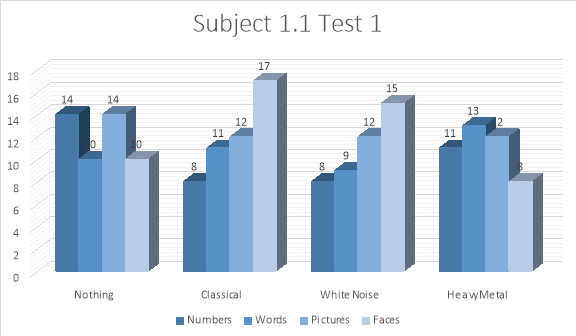
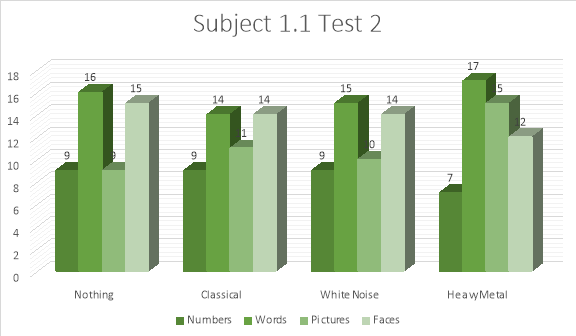
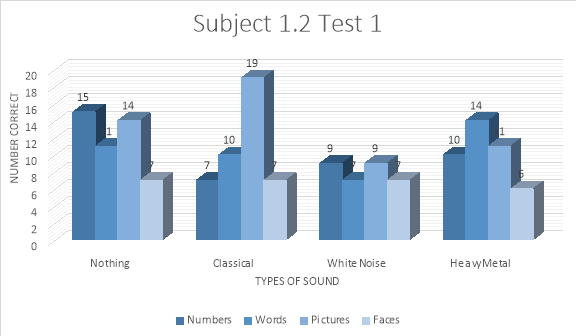
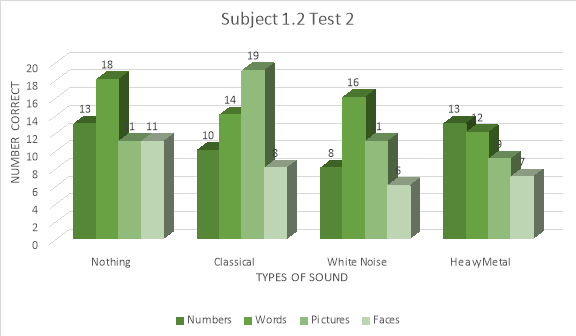
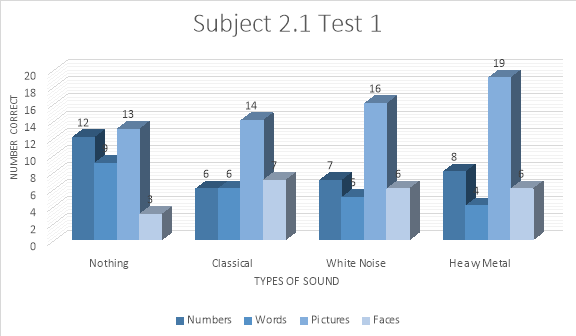
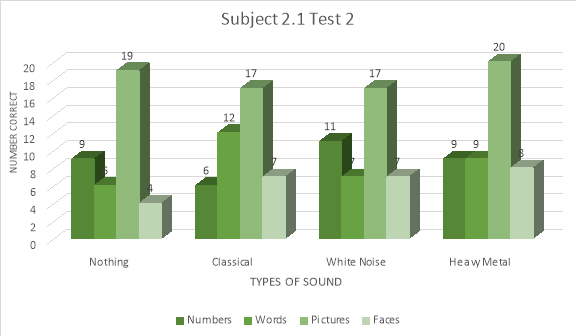
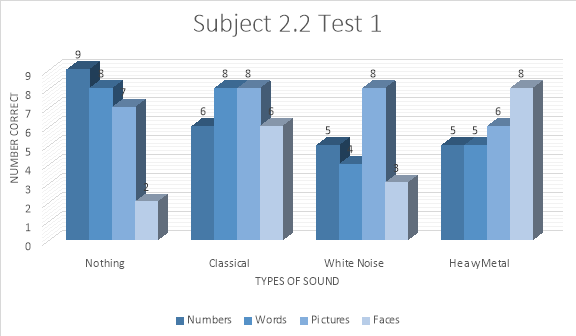
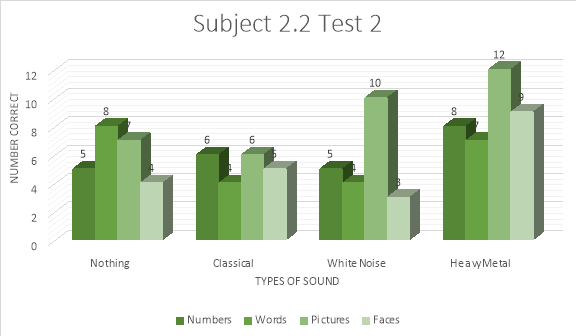
Discussion
Originally 10 subjects were planned to participate in the experiment but only 4 subjects consistently volunteered over the course of the experiment. For those that participated, the experiment method was followed. The test results were reviewed and for each participant the score was averaged. Subject 1.1 did better listening to nothing, Subject 1.2 on did better listening to nothing, Subject 2.1 on did better listening to heavy metal and Subject 2.2 on did better listening to heavy metal. There was initially an expectation that the test subjects would do better while listening to classical music because of the studies that have reported listening to classical music helps to retain information (Mac, Takelessons). The hypothesis was incorrect based on these test subjects. The results may have been impacted by the limited number of participants and personal preferences.
Conclusion
The group of younger test subjects, under 18, were able to remember more than the group over 18. No one specific sound was found to be consistently beneficial for any particular test or person. It was observed that for some tests (numbers, words, pictures, faces) different sounds appeared to show a positive result.
Cite This Work
To export a reference to this article please select a referencing stye below:
Related Services
View allDMCA / Removal Request
If you are the original writer of this essay and no longer wish to have your work published on UKEssays.com then please click the following link to email our support team:
Request essay removal


